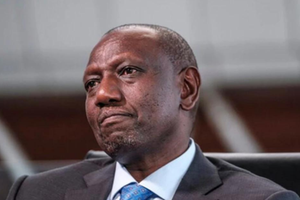Why Kenyans need to elect proven devolution champions to protect it

ODM leader Raila Odinga (third left), Interior CS Fred Matiangi (second left), Senate Speaker Kenneth Lusaka (left), Council of Governors chairman Martin Wambora (third right), Devolution CS Charles Keter (second right) and Environment CS Keriako Tobiko (right) during the 7th Devolution Conference at Makueni County on November 24, 2021.
The devolution system of governance is at the heart of the current Constitution, now in 12th year.
Devolution is the single-most defining feature of the Second Republic, expressing the collective aspirations of a Kenya that is the equitable and inclusive society envisioned by Founding Fathers.
In 2013, President Uhuru Kenyatta assumed the historic role of being the first Head of State to mid-wife devolution through his Jubilee administration.
That has been through disbursing material and human resources to the devolved units and pushing enabling legislation through Parliament to guide and anchor the devolution firmly in the law.
One index of the success of the devolution project is demonstrated in the manner in which funds have been pushed to the county governments—over and above the prescribed 15 per cent of sharable revenues.
By last year, they received up to 35 per cent of national government tax revenues. The funds are channelled through the National Government Constituency Development Fund (NG-CDF), bursary fund and rural roads construction and maintenance funds, among others.
Where local leadership got the script right by leveraging prudent management of resources with sound policy priorities, it is evident that devolution offers good prospects for effecting real change in people’s lives by bringing public service delivery closest to where they are needed most.
Devolution has also acted as a catalyst and stimulation of innovation and evolution of many centres of economic growth, as opposed to the previous highly centralised national development.
For instance, Makueni and Laikipia counties are often cited as examplary in interpretation of the devolution concept and its translation into service delivery actions that result in transformation of lives, communities and economies by stimulating local manufacturing and innovation.
Disappointingly, however, most of the other county governments have, disappointment posted dismal performance.
Issue blank cheque
Corruption has become the bane that defines the tenure of most governors, many of whom spend precious service delivery time in courts, as defendants in criminal cases, while some have been impeached.
Most governors seem to believe that the national government is obliged by the law to issue them a blank cheque when they fall due with few questions asked. Some county government officials act and make public statements as if to suggest that the national government is a bottomless cash hole whose bounty is inexhaustible.
For instance, local media regularly carry advertisements placed by governors declaring waivers to penalties against land rate defaulters in the pretext that it was an incentive to persuade the laggards to pay up. But they see this as a way to make themselves popular.
The obligatory annual disbursement from the National Treasury seems to have acted as a disincentive to collect local taxes that would go a long way in boosting service delivery. Counties have cumulatively generated pending bills in a worrying manner.
Many small and medium enterprises (SMES) have thus collapsed at the hands of county governments. Over Sh4o billion in pending bills induced a liquidity crisis that took the National Treasury’s intervention to resolve last year.
It is evident that devolution is a popular governance and resource distribution innovation. It is also true that there is an urgent need to rein in errant governors and entrench a sound management culture that is devoid of impunity.
This is only possible, however, if Kenyans chose to elect proven champions of devolution, who have the passion and commitment to make the method of governance to deliver the vision of our fathers for equity and inclusivity. The alternative is impunity, frustration, regrets and missed opportunities.
Let us cast the ballot wisely on August 9.
Mr Kwinga is a political scientist. skwinga@ gmail.com.





